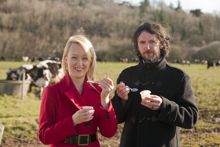2010 Press Releases
13.04.2010
A bacteria commonly found in probiotic yoghurts has been shown to be a safe and effective way to deliver gene therapies to treat cancer, by a research team at the Cork Cancer Research Centre, UCC. The research, which has been funded by the Health Research Board, will be published in the Nature journal - Molecular Therapy today (April 13th 2010).
“The main goal of cancer treatment is to focus therapy on tumours without harming healthy cells,” says Dr Mark Tangney, Principal Investigator at Cork Cancer Research Centre, UCC. “When a patient’s cancer has spread, then ideally, a treatment should be administered throughout a patient’s body (e.g. intravenous administration) to allow treatment of any tumours present, including secondary tumours at early stages of development.”
“However, current chemotherapy drugs administered in this fashion are toxic to many healthy cell types, often resulting in severe side effects for the patient. This is why we are so excited about this research. We have shown that harmless bacteria (bifidobacteria) have a natural ability to travel through the body and grow specifically inside tumours. We have demonstrated for the first time that following ingestion of bifidobacteria in large numbers, these bacteria can leak out from the gut into the blood and grow inside tumours throughout the body where they can produce whatever we want. We can now genetically engineer these bacteria so that they will pump out anti-cancer agents specifically inside tumours,” explains Dr Tangney. “These new results suggest we can overcome a major barrier to achieving an efficient and safe gene medicine for cancer.” Ingesting the manipulated bacteria is also a more effective way of delivering the cancer therapy as it allows larger therapeutic doses to be given and is easier for patients to handle.
Speaking about the work published today, Noriyuki Kasahara, President of the International Society for Cell and Gene Therapy of Cancer said: “The work being done at Cork Cancer Research Centre at UCC is certainly at the cutting edge of science: no one has ever shown before that you can take an orally administered safe bacteria and have it hone into a tumour mass before and act there.”
Commenting on the research, Enda Connolly, Chief Executive at the Health Research Board (HRB) said: “This is a discovery with great potential to directly improve the care of cancer patients and reinforces the importance of supporting health research that is patient-oriented. Turning this type of innovative discovery into a reality in Ireland is where our future lies. This is the type of work that the HRB will be supporting in order to improve patient care and deliver commercial opportunities.”
The next stage in the development of this treatment approach
will be a Phase 1 clinical trial. A 3D animation, illustrating the bacterial
delivery of a target gene to tumours in patients, is now available to view on
the Cork Cancer Research Centre's website http://www.ccrc.ie
Despite significant advances in modern therapeutics, cancer still represents a massive burden on society and is predicted to overtake heart disease as the leading cause of mortality in the developed world. Conventional therapies are hampered by their inability to identify and eradicate small numbers of circulating cancer cells (micro-metastases), the development of tumour cell resistance and the narrow therapeutic index of many treatments. New approaches to cancer cell and gene therapy have potential in sustaining both longevity and the quality of life for cancer sufferers. All cancers have the potential to be treated by cell and gene therapy.
Notes:
The Cork Cancer Research Centre is an independent research centre focused on developing new treatments for secondary cancer. Key to centre’s success is the clear collaboration between surgeons and physicians in practice with speciality cancer researchers to apply their findings in practice. The research was carried out by Michelle Cronin with Dr Mark Tangney as Principal Investigator. It was funded by the Health Research Board, the lead agency supporting health research in Ireland, who has invested € 1.2m in the CCRC to date.
Molecular Therapy is the number one journal worldwide for research in Cell and Gene Therapy
Bifidobacteria are commonly found in dairy products and most bifidobacteria are native, harmless residents of the human gut. Certain bifidobacterial strains have been shown to have health promoting or probiotic benefits, and their oral use in humans is widespread. Bifidobacteria have already been employed for probiotic therapy and therefore their clinical safety has already been established.
Picture: Michelle Cronin and Dr Mark Tangney, of the Cork Cancer Research Centre at UCC
RMcD

